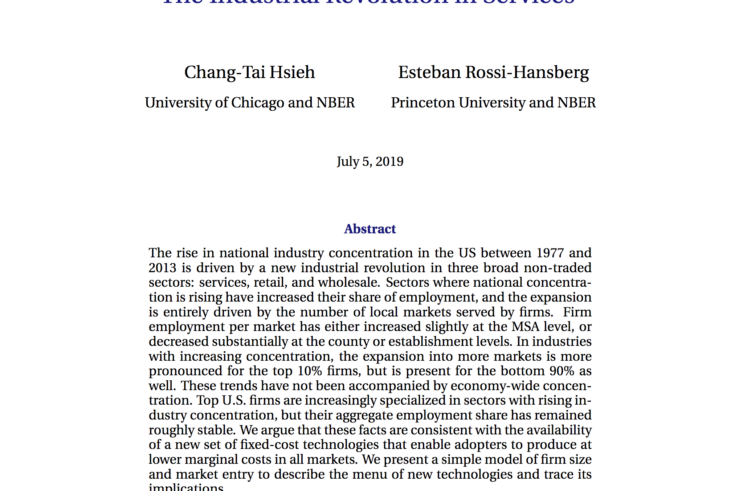Showing archive for: “Economics”
Inevitable Monopolies and More Maverick Madness
In antitrust lore, mavericks are magical creatures that bring order to a world on the verge of monopoly. Because they are so hard to find in the wild, some researchers have attempted to create them in the laboratory. While the alchemists couldn’t turn lead into gold, they did discover zinc. Similarly, although modern day researchers ... Inevitable Monopolies and More Maverick Madness
What Can the Stock Market Tell Us About the T-Mobile/Sprint Merger?
On Monday evening, around 6:00 PM Eastern Standard Time, news leaked that the United States District Court for the Southern District of New York had decided to allow the T-Mobile/Sprint merger to go through, giving the companies a victory over a group of state attorneys general trying to block the deal. Thomas Philippon, a professor ... What Can the Stock Market Tell Us About the T-Mobile/Sprint Merger?
Manne & Stout 2: Against Incorporating a Contract/Merger Equivalency Assumption in Vertical Merger Guidelines
In our first post, we discussed the weaknesses of an important theoretical underpinning of efforts to expand vertical merger enforcement (including, possibly, the proposed guidelines): the contract/merger equivalency assumption. In this post we discuss the implications of that assumption and some of the errors it leads to — including some incorporated into the proposed guidelines. ... Manne & Stout 2: Against Incorporating a Contract/Merger Equivalency Assumption in Vertical Merger Guidelines
Manne & Stout 1: The Illogic of a Contract/Merger Equivalency Assumption in the Assessment of Vertical Mergers
[TOTM: The following is part of a symposium by TOTM guests and authors on the 2020 Vertical Merger Guidelines. The entire series of posts is available here. This post is authored by Geoffrey A. Manne (President & Founder, ICLE; Distinguished Fellow, Northwestern University Center on Law, Business, and Economics ); and Kristian Stout (Associate Director, ... Manne & Stout 1: The Illogic of a Contract/Merger Equivalency Assumption in the Assessment of Vertical Mergers
Kolasky: The DOJ and FTC Should Revise Their Proposed Vertical Merger Guidelines to Emulate the EU’s
On January 10, the Department of Justice (DOJ) withdrew the 1984 DOJ Non-Horizontal Merger Guidelines, and, together with the Federal Trade Commission (FTC), released new draft 2020 Vertical Merger Guidelines (“DOJ/FTC draft guidelines”) on which it seeks public comment by February 26.[1] In announcing these new draft guidelines, Makan Delrahim, the Assistant Attorney General for ... Kolasky: The DOJ and FTC Should Revise Their Proposed Vertical Merger Guidelines to Emulate the EU’s
Nuechterlein: Guidelines without Guidance on Vertical Mergers
[TOTM: The following is part of a symposium by TOTM guests and authors on the 2020 Vertical Merger Guidelines. The entire series of posts is available here. This post is authored by Jonathan E. Nuechterlein (Partner, Sidley Austin LLP; former General Counsel, FTC; former Deputy General Counsel, FCC).] [Nuechterlein: I represented AT&T in United States ... Nuechterlein: Guidelines without Guidance on Vertical Mergers
Ghosts of Antitrust Past: Part 4 (Microsoft)
The DOJ and 20 state AGs sued Microsoft on May 18, 1998 for unlawful maintenance of its monopoly position in the PC market. The government accused the desktop giant of tying its operating system (Windows) and its web browser (Internet Explorer). Microsoft had indeed become dominant in the PC market by the late 1980s: But ... Ghosts of Antitrust Past: Part 4 (Microsoft)
The Upsides of Collusion and Concentration
Conspiracies and collusion often (always?) get a bad rap. Adam Smith famously derided “people of the same trade” for their inclination to conspire against the public or contrive to raise prices. Today, such conspiracies and contrivances are per se illegal and felonies punishable under the Sherman Act. It is well known and widely accepted that ... The Upsides of Collusion and Concentration
Efficient Cartels and the Public Interest Defence – Do They Exist?
The concept of a “good” or “efficient” cartel is generally regarded by competition authorities as an oxymoron. A cartel is seen as the worst type of antitrust violation and one that warrants zero tolerance. Agreements between competitors to raise prices and share the market are assumed unambiguously to reduce economic welfare. As such, even if ... Efficient Cartels and the Public Interest Defence – Do They Exist?
Towards a Democratic Antitrust
This symposium discusses the “The Politicization of Antitrust.” As the invite itself stated, this is an umbrella topic that encompasses a wide range of subjects: from incorporating environmental or labor concerns in antitrust enforcement, to political pressure in enforcement decision-making, to national security laws (CFIUS-type enforcement), protectionism, federalism, and more. This contribution will focus on ... Towards a Democratic Antitrust
“Politicization of Antitrust:” An Opportunity
[TOTM: The following is the first in a series of posts by TOTM guests and authors on the politicization of antitrust. The entire series of posts is available here.] This post is authored by Steven J. Cernak, Partner at Bona Law and Adjunct Professor, University of Michigan Law School and Western Michigan University Thomas M. Cooley ... “Politicization of Antitrust:” An Opportunity
What if rising concentration were an indication of more competition, not less?
An oft-repeated claim of conferences, media, and left-wing think tanks is that lax antitrust enforcement has led to a substantial increase in concentration in the US economy of late, strangling the economy, harming workers, and saddling consumers with greater markups in the process. But what if rising concentration (and the current level of antitrust enforcement) ... What if rising concentration were an indication of more competition, not less?






